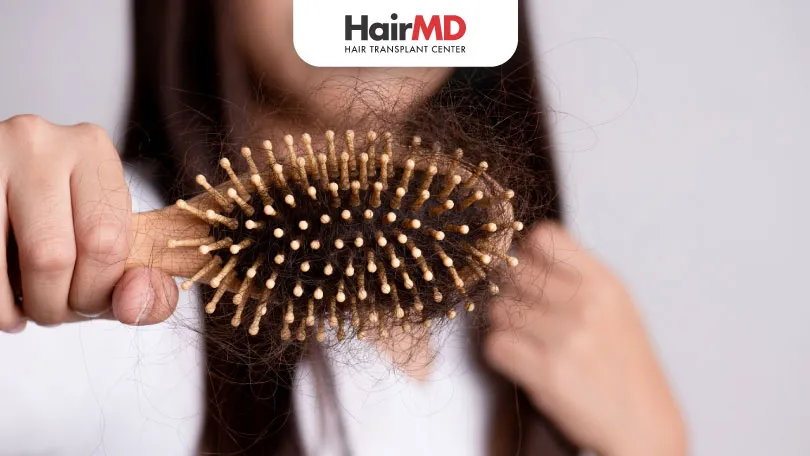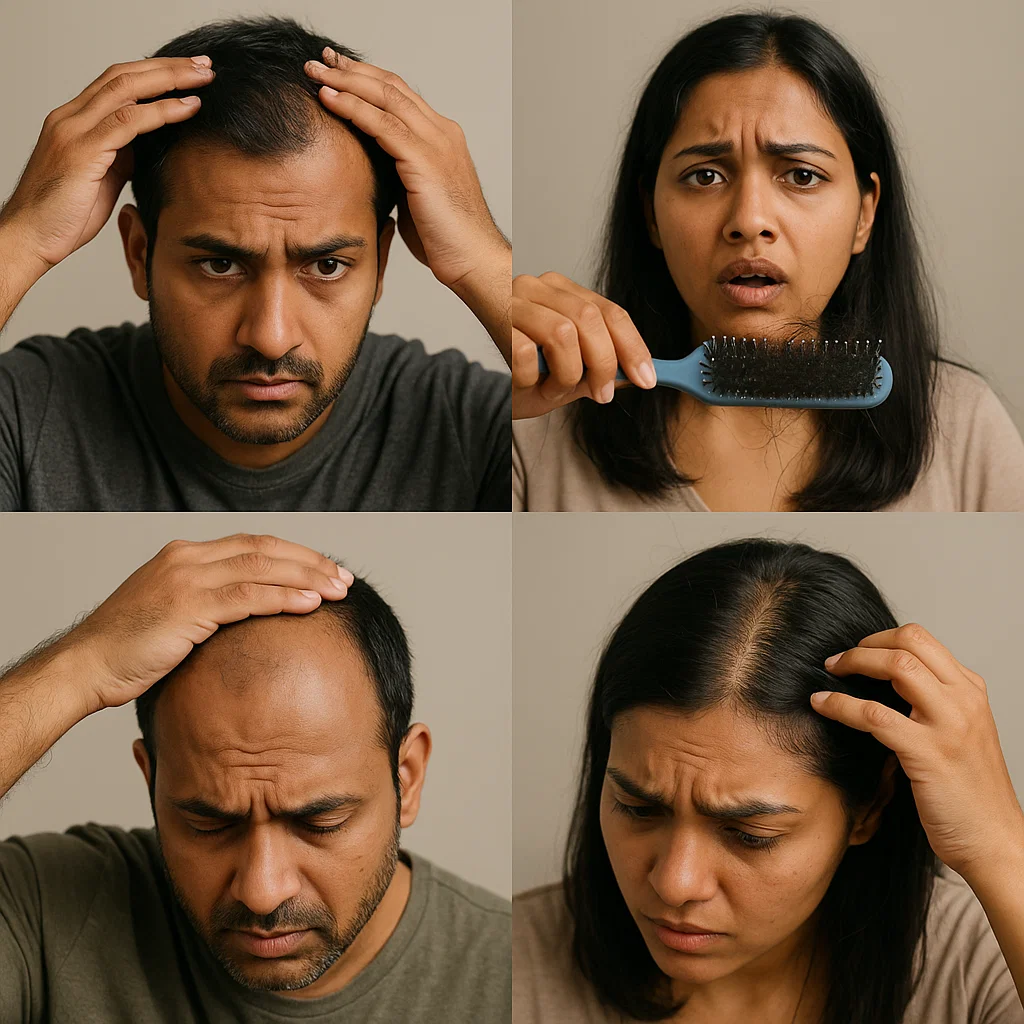
Hair loss has become a growing issue in the 21st century. Many emotional, medical and lifestyle-driven factors affect the growth and strength of hair. Hair loss is different from the normal shedding of hair. You must know that every day we shed somewhere around 50-100 hair strands as a part of the normal hair growth cycle. The hair growth cycle involves the shedding phase, where damaged hair strands fall on their own from the hair follicles.
After the hair naturally falls, new hair regrows from the follicle. However, when we talk about hair loss, then hair regrowth is halted until the cause is treated. This deadlock leads to baldness and can be permanent. There are many reasons behind hair loss, from hormonal changes to an unhealthy lifestyle. Today in this blog, we will discuss the hair loss causes that you were not aware of but were leading to thinning of hair and the formation of bald patches.
What’s covered in the article?
- Hair Loss Causes
- Conclusion
Hair Loss Causes
Common Causes of Hair Loss Simplified
Hair loss is a concern that affects both men and women, but understanding its causes can help you address the issue effectively. Below, we break down some of the most common causes of hair loss and offer tips to mitigate or treat them.
1. Physical Stress
Severe physical stress can have a significant impact on the body, including your hair. Situations such as accidents, surgeries, illnesses, or even childbirth can disrupt the hair growth cycle, leading to temporary hair loss. This type of hair loss, known as telogen effluvium, happens because the body is prioritizing essential functions, like healing and recovery, over non-essential ones like hair growth. Signs of this kind of hair loss include thinning or shedding that occurs a few months after the stressful event. The good news is that once the physical stress subsides and the body recovers, the hair typically begins to regrow. Supporting your recovery with proper nutrition, rest, and care can further accelerate the process.
2. Emotional Stress
Major emotional stress, such as grief, anxiety, or significant life changes, can also cause hair loss. Emotional distress disrupts the natural growth cycle of hair, pushing hairs prematurely into the shedding phase. While the hair loss is usually temporary, it can be distressing for those experiencing it. Stress management techniques such as mindfulness, yoga, meditation, or regular exercise can play an important role in resetting your hair growth cycle naturally. Additionally, seeking support from friends, family, or a therapist can help alleviate emotional stress, leading to noticeable improvements in hair health.
3. Unhealthy Diet and Lifestyle
Your diet and lifestyle play a vital role in maintaining healthy hair. Poor nutrition, including deficiencies in essential vitamins and minerals like iron, zinc, biotin, or vitamin D, can lead to weakened hair follicles and hair loss. Similarly, habits such as smoking, consuming excessive alcohol, insufficient sleep, or chronic dehydration can have a cumulative negative impact on hair health. A lack of proper nutrients means the hair doesn’t get the building blocks it needs for growth and strength. Harsh hair treatments, including frequent use of dyes or chemical relaxers, can also exacerbate the issue. To combat this, prioritize eating a well-balanced diet rich in proteins, fruits, vegetables, and healthy fats, and avoid unhealthy lifestyle practices. Drinking plenty of water, exercising regularly, and ensuring you get enough sleep can make a significant difference in both your overall health and your hair.
4. Hair and Scalp Infections
Conditions that affect the scalp, such as fungal infections, dandruff, or product sensitivities, are commonly overlooked causes of hair loss. Infections like ringworm can weaken the hair follicles, while excessive dandruff may clog the hair roots, hindering growth. In some cases, reactions to specific hair care products may result in inflammation or irritation, further contributing to hair loss. It’s important to diagnose and treat these issues promptly. Seeking help from a dermatologist for appropriate treatment, such as medicated shampoos, antifungal creams, or oral medications, can restore scalp health and stimulate hair regrowth. Maintaining good scalp hygiene and avoiding products that aggravate your skin are essential steps in preventing further damage.
5. Hormonal and Medical Conditions
Hormonal imbalances are a frequent cause of hair loss, particularly in women. Pregnancy, menopause, polycystic ovary syndrome (PCOS), or thyroid disorders can disrupt hormone levels and lead to temporary or gradual hair loss. For example, during pregnancy, elevated hormones often support thicker hair, but postpartum hormonal shifts can trigger increased shedding. Autoimmune diseases like alopecia areata, which cause the body’s immune system to attack hair follicles, can lead to localized or widespread hair loss. Medical treatments, such as chemotherapy or radiation therapy, often cause more severe hair loss, which may be permanent or reversible depending on the treatment type. Addressing these underlying conditions with the help of a healthcare provider or dermatologist is crucial. Hormone therapy, medications, or tailored treatments can help manage the effects and promote regrowth.
6. Poor Hair Care Practices
Everyday hair care habits can significantly influence hair health. Over-styling, frequent use of heat tools like straighteners or curling irons, and tight hairstyles (such as ponytails or braids) can weaken hair strands and lead to hair breakage or traction alopecia. Aggressive brushing, especially on wet hair, or using harsh shampoos and conditioners can also strip your hair of natural oils, leaving it vulnerable to damage. To minimize preventable hair loss, opt for gentle, sulfate-free shampoos and conditioners, and avoid over-washing your hair. Limit the use of heat styling tools and always use a heat protectant spray when you do. Choose looser hairstyles that don’t place tension on the roots, and protect your hair from environmental factors like UV exposure or chlorine in swimming pools.
7. Genetics
For many people, genetics play a primary role in hair loss. Conditions such as male-pattern baldness or female-pattern baldness are hereditary and tend to become more noticeable with age. This type of hair loss, known as androgenetic alopecia, typically follows a predictable pattern, such as a receding hairline for men or thinning at the crown for women. While genetic hair loss cannot be entirely prevented, early intervention can slow its progression. Treatments such as minoxidil, finasteride, or hair transplant surgery may be effective options for managing hereditary hair loss. Consulting a Hair specialist can help you explore the best course of action based on your needs.
Taking Action
Experiencing hair loss can be disheartening, but the good news is that many causes can be addressed with the right approach. Whether it’s improving your diet, managing stress, adopting better hair care practices, or seeking medical advice, there are steps you can take to restore your hair and boost your confidence. Pay attention to the root causes of your hair loss and make changes early to maximize your chances of recovery. Remember, healthy hair starts with a healthy you!!

DO YOU KNOW?
Nearly 250 Patients Visit HairMD
Everyday For Various Hair Concerns
(15+ Years Of Expertise. 4157+ Successful Hair Transplant)
Meet Our Dermatologists
Conclusion
However, on the other hand, causes like hormonal changes, genetic composition, medical conditions, and infection demand treatment from a hair loss doctor. If you report any of these causes are making your hair fall out and making your hair thin, then you must contact your nearest dermatologist immediately. The doctor will not only help you find the reason behind the excessive hair loss but will also prescribe you treatments to treat your hair problems right away. So, visit your dermatologist to filter the causes and deal with them on time.
Further Reading
Female Hair Transplant in Pune – What You Need to Know
Complete guide to female hair transplant in Pune. FUE technique, 90-98% success rates, 2-5 days recovery. Dr. Sachin Pawar, 2,500+ surgeries, 20+ years experience.
Long-Term Maintenance After Hair Transplant – Pune Guide
Comprehensive checklist of essential questions to ask during your hair transplant consultation in Pune. Learn how to verify surgeon credentials, spot red flags, and make informed decisions at HairMD India.
How to Avoid the “Doll Hair” Look? A Guide to Natural Hairline Design
Looking for a natural hair transplant in Pune? A hair dermatologist explains how proper hairline design avoids fake, doll-like results.
The 2026 Hair Transplant Cost Guide: Per Graft vs. Per Session Pricing
Discover how many grafts you actually need for a natural hair transplant. Get expert planning based on your hair loss stage.
Have thoughts? Please let us know
We are committed not only to treating you, but also educating you.










